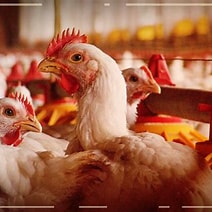Official tells Valor measure is about wrongdoings, not deforestation
06/01/2022

Five years after imposing stricter controls on the sales of Brazilian chicken meat, the European Union has signaled that it has no plans in sight to suspend the measure, despite persistent demands from the Brazilian side.
In Brazil, the complaint is that the EU’s Directorate General of Health (DG Health) is, in practice, linking sanitary and phytosanitary measures (SPS) to deforestation issues, delaying the search for a solution to the problem, which affects millions of dollars in business.
To Valor, the EU said that “this is not correct”. According to a senior European official, “the current measures [of strengthened control over meat] are related to cases of fraud involving authorities and to the results of successive audits that have identified repeated deficiencies that demonstrate the unreliability of the Brazilian certification system.”
The official recalled that the strengthened control — 100% documents and 20% through physical and laboratory inspection (in Brazil and the EU), something unusual — was adopted in 2017 after the operations “Carne Fraca” and “Trapaça” in Brazil, which had negative results in the EC audits in the segments of meat and fish.
The source noted that while the fraud scandals involved officials at the Agriculture Ministry in illegally exporting cargoes to the EU and other countries, the 2017 audits showed “that the deficiencies identified by previous audits had not been corrected, despite the promises made.”
According to the EU, “in these circumstances the protective measures cannot be lifted and the authorization of additional sellers (re-authorizing the pre-listing procedure), additional products (pork, dairy, eggs) or additional production areas (for export) cannot be considered until a follow-up audit shows that corrective measures have been implemented to rectify the deficiencies and prevent fraudulent export practices.”
“For the EU, only a favorable outcome of an audit in Brazil will allow the European Commission to propose to the 27 member states to lift the current control on Brazilian chicken meat.” The commission has included an audit in Brazil in its work program for 2022. However, it has already warned that the feasibility of doing it “will depend on the evolution of the audit backlog caused by the pandemic and the need to ensure the safety of auditors in the current epidemiological situation of Covid-19.”
The strengthened control causes an additional cost that is ultimately discounted from the price of chicken. The EU mentions this “lack of confidence” in the Brazilian sanitary certification system (and despite all the controls), but also has Brazil as the supplier of 20% of all the chicken meat it imports.
Between January and April this year, the block imported 71,700 tonnes of Brazilian chicken meat, 27.8% more than in the same period last year, according to the Brazilian Association of Animal Protein (ABPA).
The finding, both in Brazil and in Europe, is that there has been a deterioration of the dialogue with DG Health of the EU. The situation has worsened since November, when Brazil denounced the EU at the World Trade Organization (WTO) because of “discriminatory sanitary controls for the detection of salmonella in salted chicken and turkey meat with pepper.”
There has been a “gigantic logjam” in bilateral talks ever since, deepening the sanitary mess started under the previous administration. In 2017, soon after the announcement of “Carne Fraca”, the EU sent an audit team to Brazil, with Irish veterinary inspectors, despite all the pressure that European producers were putting in the opposite direction.
The Europeans inspected several businesses and returned with a good impression. A draft of a positive report was ready when “Trapaça” broke out, involving food processing giant BRF and third parties laboratories that controlled the exported chicken meat.
The Irish vets felt betrayed, as they were not informed that this additional Federal Police operation was underway. Officials from the Ministry of Agriculture knew, as they were following the Federal Police, but apparently were forbidden to inform them. The Irish inspectors were left with their reputation threatened, since they advocated a return to normal relations with Brazil.
The situation was made worse when the then Minister of Agriculture, Blairo Maggi, did not remove BRF from the list of exporters even after the scandal involving the company. This forced the EU to issue a specific regulation removing all the company’s units, and a few others, from the list of exporters to the European market, which is unusual. Normally, Brussels suggests the blockade and the exporting country itself removes the meat packing plant from the list, which makes it easier to return.
After this, BRF, which has long ensured that there were no wrongdoings in its products, filed a complaint at the EU court disputing the regulation that barred its sales. It failed and was banned from exporting for human consumption, while entering in the radar zone of European surveillance. On top of that, the Europeans don’t even want to schedule meetings to talk about the suspension of the strengthened control.
Source: https://valorinternational.globo.com/agribusiness

/i.s3.glbimg.com/v1/AUTH_37554604729d4b2f9f3eb9ad8a691345/internal_photos/bs/2022/a/X/tTlcD9R9qnzX5ZAloyJg/img20220531161739546.jpg)